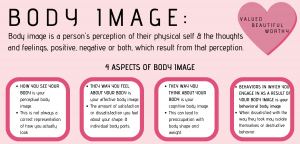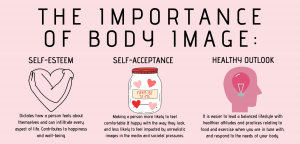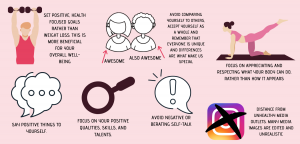Student Health & Counseling Center
Home » Resources » Student Health & Wellness » Physical Wellness » Body Image
MenuBody Image
Body Image
Someone with a healthy body image has a clear perception of their body; understands that someone’s physical appearance says very little about their value as a person; refuses to spend unreasonable amounts of time worrying about food, weight, and calories; and is comfortable and confident in their own skin.
If someone has an unhealthy body image, does it mean that they have an eating disorder?
No. Many people feel poorly about their bodies from time to time, but it does not mean that they necessarily have an eating disorder. It is important to recognize that it is normal to struggle with how we feel about our bodies. However, it is also important to recognize the signs and symptoms someone might display if they have an eating disorder.
What are the major influences on how someone views their body?
While there are endless pressures that influence the way we feel about our bodies, there are several major influences that help to shape a person’s sense of themselves and their bodies, including:
-
- Peers
- Media
- Family
- Culture
Why is Body Image Important?
How can I make myself feel better if I’m having a bad body image day?
Some aspects of your appearance can be changed, however, others like your height, muscle composition and bone structure have genetic components. Challenging beauty ideals and learning to accept your body shape is a MAJOR step towards positive body image. Realize you have the power to change the way we see, feel and think about our bodies. Here are some helpful tips:
- Engage in physical activity — play tennis, go for a jog, dance around in your room to your favorite song.
- Remember that you are so lucky to have a healthy, strong functional body — wear some of your favorite clothes; wear clothes that you feel comfortable in and make you happy.
- Treat your body — paint your toenails, get a massage, or simply sit down and put your feet up; your body works hard for you each day and sometimes you forget to appreciate it.
- Mentally list at least three qualities and talents about which you are proud.
- Think of the reasons you like your friends — they probably don’t have anything to do with their appearance, and neither are the reasons that your friends like you.
- Make plans with a friend that you have been meaning to catch up with to go for a walk or a cup of coffee.
- Take the step to tackle a long-term project you’ve been putting it off…whether it’s cleaning your room or signing up for a pottery class, there is no better time than right now.
- Take a few moments for relaxation– you can do this sitting waiting for class to start or on a bench outside; inhale deeply through your nose for a count of five, filling your lungs with cool air and positive energy, and then exhale slowly through your mouth. You could also visit our R&R Room for rest and relaxation time.
- When you exercise, think of your bones and muscles getting stronger — think of this and your blood circulating throughout your body rather than focusing on calories and weight loss.
- At meals, eat healthy colorful foods — and, think of energy, vitamins and nourishment you are fueling your body with.
On Campus Resources:
Off Campus Resources:
- National Eating Disorders Collaboration
- The National Eating Disorders Association (NEDA): supports individuals and families affected by eating disorders.
- Academy for Eating Disorders (AED): provides global access to knowledge, research and best treatment practice for eating disorders.
- National Association of Anorexia Nervosa & Related Disorders (ANAD): alleviate the problems of eating disorders, especially anorexia nervosa and bulimia nervosa.
- Binge Eating Disorder Association (BEDA): committed to helping those who suffer from binge eating disorder conquer their disorder. So, if you or someone you care about lives with binge eating disorder, BEDA can help. If you treat the disorder, BEDA can help.
- Eating Disorders Coalition (EDC): Their mission is to advance the federal recognition of eating disorders as a public health priority.
- Multi-Service Eating Disorder Association (MEDA): prevention and treatment of eating disorders and disordered eating. MEDA serves as a support network and resource for clients, loved ones, clinicians, educators and the general public.
- The National Association for Males with Eating Disorders (N.A.M.E.D.): is to provide support to males with eating disorders, to educate the public on the issue, and to be a resource of information on the subject.
Source: https://www.nedc.com.au/eating-disorders/eating-disorders-explained/body-image/




